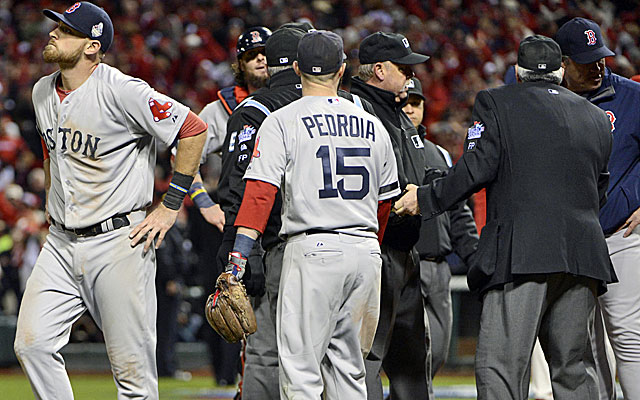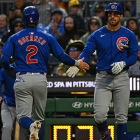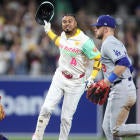
ST. LOUIS – Already, Game 3 was hurtling forward with the force of a tropical storm, gaining momentum, barometric pressure changing. Momentum swirling. St. Louis. Boston. St. Louis again. It built and built until it reached the ninth inning, when one of the most memorable World Series games ever played raged to a conclusion that has never before happened.
They played an entire series’ worth of games here Saturday night in nine stuffed innings, baseball that Stan Musial and Dizzy Dean woud have been proud of, a game that Carlton Fisk and Ed Armbrister in particular would appreciate.
When it ended, and it is a shame they couldn’t have continued playing this one until the dawn’s early light, Allen Craig was scoring the winning run from third on an obstruction call when Will Middlebrooks kicked up both of his legs and tripped Craig.
Score that one obstruction, and score it a 5-4 St. Louis win.
It was the first time in World Series history that a game ended on an obstruction call, but third-base ump Jim Joyce absolutely got it right.
Middlebrooks, who now surely has the most viewed legs this side of Kate Upton with replays firing throughout the night, would say he was simply attempting to scramble to his feet.
Craig would say he still wasn’t quite sure what happened.
Cardinals manager Mike Matheny called it a “tangle.” Red Sox manager John Farrell called it a “tough way to have a game end.” Anybody who watched called it a classic.
Not only was it the first World Series game ever to end on an obstruction error (the rules charge that to Middlebrooks), according to the Elias Sports Bureau, it was only the fourth World Series game ever to end on any kind of error.
When it finished, players on both sides still were attempting to connect the dots.
“What happened?” Cardinals shortstop Pete Kozma said. “I have no idea what happened. I have to go and look at it, like, 10 times.”
Pull up a seat next to the rest of us.
“I was just trying to get up,” Middlebrooks said. “I was trying to push myself up. I don’t understand it. There’s nowhere for me to go right there.”
“I don’t know what happened,” Craig said. “I don’t know if I was safe or out. I don’t know if he clipped me or not.”
“I was nervous in the dugout,” Cards left fielder Matt Holliday said. “I couldn’t see. I have to find out what happened.”
The Red Sox were furious. The Cardinals were overjoyed.
Between taking a 2-1 lead in Game 3 and winning the Roberto Clemente Award for positive contributions and humanitarian behavior off the field, Cardinals right fielder Carlos Beltran called it “the best day of my life. I mean, after getting married.”
Win this World Series, and they will be celebrating the anniversary of this night for years in Missouri.
It all started with runners at second and third, one out, the score 4-4 and Boston’s infield pulled in for a play at the plate. Jon Jay obliged with a sharp ground ball to second baseman Dustin Pedroia’s right, a ball Pedroia, fully extended, was all over like a swarm of bees to honey.
He scrambled to his feet and threw home to nail Yadier Molina, a sensational, winning play that suddenly was lost in the shuffle just seconds later.
Craig, who had cracked a pinch-hit double, got a bad break to third on the play, and catcher Jarrod Saltalamacchia thought he saw an opening to end the inning. But his throw to third was wide, and if there is an unfortunate trend developing for the Red Sox in this World Series, it is the errant throw to third. They lost Game 2 when reliever Craig Breslow air mailed a throw – also from home to third -- into the stands to fuel St. Louis’ winning rally.
Now, left fielder Daniel Nava scrambled over to save the day at the same time Craig was scrambling to his feet. Middlebrooks, face down in the infield dirt from his dive trying to grab Saltalamacchia’s bad throw, also was trying to get back up.
From the dugout, Beltran said, he saw Nava make a “great” play, he saw Craig being thrown out at the plate – by two or three steps – and then, instead of 4-4 heading into the 10th inning, there suddenly wasn’t a 10th inning.
“Man, it was unbelievable,” Beltran said. “The umpire saw it clear, like the same way he saw Pete Kozma missing the ball in Boston.
“At the end of the day, they made the right call.”
Do not talk to the Red Sox, or any resident of Red Sox Nation, about obstruction. There is history here, but for Boston it is the Stephen King-type of horror history. The Sox now are 0 for 2 when it comes to obstruction in the World Series.
It was another Game 3, this one in 1975 in Cincinnati’s Riverfront Stadium, when Armbrister dropped a bunt with Cesar Geronimo on first base and then appeared to run out of his way in front of the plate to block Fisk from fielding it. Fisk wound up sailing his throw attempting to get Geronimo into center field.
In that case, obstruction was not called, runners landed on second and third, and three batters later, Joe Morgan won the game with a single. The Reds won the Series in seven games.
Then, as now, opinions raged. Larry Barnett, the plate umpire in ’75, received death threats. The umpires here Saturday night will be no more popular in Boston, but they got it right.
As crew chief John Hirschbeck explained, obstruction “is the act of a fielder obstructing a runner when not in the act of fielding the ball. It does not have to be intent.”
What Joyce saw was “when [Craig] tried to advance to home plate, the feet were up in the air and he tripped over Middlebrooks right there. And immediately and instinctually I called obstruction.”
Talk about a wild night.
The Cardinals led 2-0 into the fifth, but Boston tied it in the sixth. They led 4-2 after seven, but the Red Sox tied it 4-4 in the eighth.
There were opportunities taken, and opportunities missed. Both sides. Jake Peavy surrendered two runs practically before the first few hot dogs were sold on a crisp Missouri autumn evening, but just when you were looking at his rough postseason history, he threw three scoreless innings that were one-part bulldog, one-part Houdini. In the fourth, he escaped a no-out, bases-loaded jam that could have blown the Red Sox out.
The Cardinals went 4 for 13 with runners in scoring position in the first eight innings yet couldn’t crack this game open.
“Typically in these kinds of games, you’re going to have to come through,” Matheny said. “But we also live on the big hit.”
Farrell zipped through his bench early and often, from batting for Peavy in the fifth to using his second-most trusted reliever, Craig Breslow, for just two batters in the seventh inning. Two batters?
You wondered if it would come back to bite the Red Sox. But at that point, Farrell was pulling every lever he could to keep the Cardinals within reach. After Breslow hit Beltran with a pitch, he couldn’t leave the lefty Breslow in to face Holliday with runners on first and second and none out. Though as things turned out, when Holliday reached down and blasted the third pitch he saw from Junichi Tazawa, a forkball down low that wasn’t a bad pitch, for a two-run double, well, worst-case scenario.
At that point, 4-2 St. Louis, Matheny couldn’t get his kids Carlos Martinez and Trevor Rosenthal into the game fast enough. But the Martinez we watched in the eighth inning was not the Martinez we watched late Thursday night in Fenway Park. Forty-eight hours later, Martinez’s curve hadn’t shipped in from Boston. He couldn’t command it.
Jacoby Ellsbury led off with a single, and then Martinez smoked Shane Victorino with a curveball that didn’t curve. Start an inning by putting the first two runners on base, especially against an opportunistic club like the Sox, you pay. By the time Nava and Xander Bogaerts batted, it was 4-4.
As Rosenthal said, “Baseball is a crazy game, and anything can happen.”
Or as Beltran said when asked whether he knew what happened: “No idea. We won. We won.”
He also estimated that within the whooping and hollering Cardinals mob that quickly developed on the field and then moved into the clubhouse, jumping and celebrating all the way, that “75 percent of the guys didn’t have any idea what had happened.”
Put that one in the history books, too: A team wins a World Series game on the very last play … and it is so chaotic that 75 percent of the celebrants have no idea how it came to pass that they are celebrating. Absolutely nuts.
“I watched the replay a couple of times, and I asked [third-base coach Jose] Oquendo what happened,” Beltran continued. “He saw it clear at third base that [Middlebrooks] put his legs up and Allen Craig tripped.”
Said Saltalamacchia: “They called him safe, and I said, ‘No way!’”
Obstruction?
“To be honest with you, I’m not sure,” said Craig, who appeared dazed more than 30 minutes after the game, after receiving treatment on his re-injured left foot. “I slid into third base, and I popped up. I knew I had to jump over him.
“I slid into home, and I immediately looked at our dugout and everyone was celebrating. That’s what I saw.”
The argument will rage across the rest of this World Series, and into the ages. Craig and Saltalamacchia will take their places right next to Armbrister and Fisk, and their story will be told and re-told.
“I saw the umpires walking away, and their players trying to convince them to change the play,” Beltran said. “We started running inside.”
Just three games in, we have no idea how this tale is going to play out. But for one crazy night that might take longer to digest than Thanksgiving dinner, we know how it ended.




















